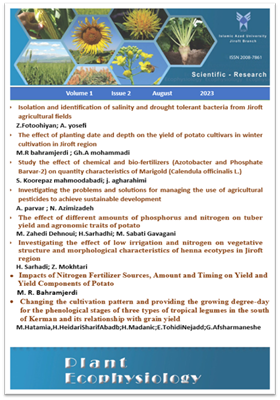Examining the problems and solutions for managing the use of agricultural pesticides to achieve sustainable development
Subject Areas : Journal of plant ecophysiologyنجمه عظیمی زاده 1 , عباس پرور 2 *
1 - گروه گیاهپزشکی، واحد رفسنجان، دانشگاه آزاد اسلامی، رفسنجان، ایران.
2 - گروه اقتصادکشاورزی، واحد جیرفت، دانشگاه آزاد اسلامی، جیرفت ، ایران.
Keywords: Sustainable Development, Environmental pollution, IPM, Pesticide management, Pest resistance,
Abstract :
In recent years, due to the increase in world population and the need to produce more food, a significant growth in the consumption of chemical pesticides has been seen in developed and especially developing countries. Although chemical pesticides are essential components of modern agriculture, they are also considered as one of the important sources of environmental pollution. Resistance of pest and disease species and weeds to chemical poisons, poisoning, destruction and severe erosion of soil, water pollution, adverse effect on non-target organisms, threat to human health and destruction of the environment are among the most important effects of these substances. are chemical. In this regard, integrated pest management (IPM) is introduced as one of the protective technologies in sustainable agriculture, which means the correct, logical and principled use of pesticides as a powerful tool along with other methods. Therefore, minimizing the use of chemical poisons, reducing the dose of poisons and using them on time, using selective, non-chemical and environmentally friendly pesticides, and finally introducing and using integrated pest management methods should be on the agenda. This is a way to achieve sustainable development in agriculture.

